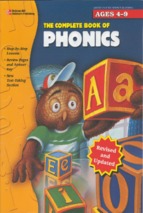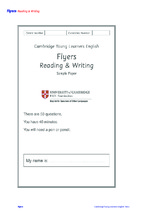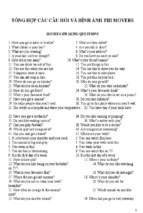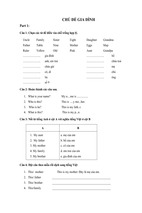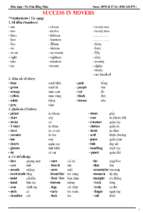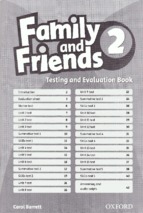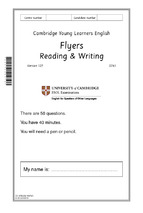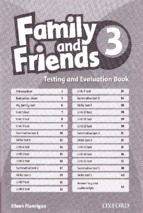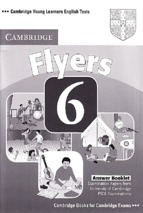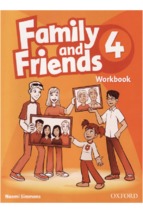B1+
CLASS AUDIO SCRIPT
UNIT 1
BE EXTREME!
Unit 1, Page 6, Exercise 3a
Unit 1, Page 7, Exercise 6b
Track 1.01 / Bey_B1plus_U01_006_1.01
Track 1.05 / Bey_B1plus_U01_007_1.05
a base jumping
b free running
c skydiving
d rock climbing
e windsurfing
f skateboarding
1 extreme
2 climb
3 bike
4 equipment
5 free
6 hill
7 ice
8 bungee
9 cliff
10 sky
Unit 1, Page 6, Exercise 3b
Track 1.02 / Bey_B1plus_U01_006_1.02
1 I started about two years ago. I’d done some sailing
before so it didn’t take me long to learn. The board is
about two to three metres long and it’s quite easy to
lose control. You need to have good balance.
2 You need to be strong both physically and mentally. It
can be dangerous so you need to train and you need
to have the right equipment. If you want to learn,
there are a lot of indoor gyms with climbing walls
where you can practise.
3 It’s all about freedom. There are no rules and no
equipment. Well, you need good shoes because
you’re going to be running, climbing, swinging,
jumping ...
4 It’s 60 seconds of free fall when you feel like you’re
on top of the world and you’re flying. Then there’s five
minutes after you open the chute. It’s the ultimate
adrenaline rush.
5 Basically, we climb to the tops of buildings, bridges,
cliffs. Anything that’s tall. And jump off. People think
we’re crazy. They’re probably right.
6 It can be dangerous especially if you’re learning a
new trick and you fall off the board. So you’ve got to
be prepared for scrapes, cuts, bruises, you know.
Unit 1, Page 6, Exercise 5
Track 1.03 / Bey_B1plus_U01_006_1.03
Boy: �Bungee jumping is jumping from a tall structure
while connected to a large elastic cord.
Girl: �Tower running is racing up staircases inside
skyscrapers or other tall structures.
Boy: �Free diving is diving underwater without any
equipment.
Girl: �Ice climbing is climbing frozen waterfalls, cliffs
and rocks covered with ice.
Boy: �Bodysurfing is riding a wave without using a
board.
Girl: �Snowboarding is travelling down a snowcovered hill while standing on a board base
jumping, bodysurfing, bungee jumping, free
diving, free running, ice climbing, rock climbing,
skateboarding, skydiving, snowboarding, tower
running, windsurfing
Unit 1, Page 7, Exercise 6a
Track 1.04 / Bey_B1plus_U01_007_1.04
wind, ski, dive
Unit 1, Page 8, Reading
Track 1.06 / Bey_B1plus_U01_008_1.06
Boy: �Find an extreme sport that’s right up your street.
Read the questions and choose the answers that
reflect your character and abilities.
Boy: 1 Do you like heights?
Girl: a I don’t mind heights.
b I don’t really like heights.
Boy: 2 How do you feel about the water?
Girl: a I’m a strong swimmer.
b �I’m not a very confident swimmer.
Boy: 3 What do you normally do?
Girl: a walk up the stairs
b take the lift
Boy: 4 Which sentence describes you?
Girl: a I’m a team player.
b I prefer my own company.
Boy: �5 �You need to cross a frozen river. It’s six metres
wide and the ice is 20 centimetres thick. It’s a
20-minute walk to a bridge. What do you do?
Girl: a I walk across the ice.
b I cross the bridge.
Boy: �Read the analysis of the questionnaire and cross
off the extreme sports on the list that aren’t right
for you.
Girl: �Choosing the right extreme sport is often a process
of elimination. If you don’t like heights then don’t
choose base jumping or other sports that involve
heights. If swimming isn’t your cup of tea then
bodysurfing and free diving are not good choices.
It’s important to know how much physical exercise
you’re prepared to do. If you usually run a mile
from anything that involves exercise, don’t try
sports that involve physical effort such as free
running. If you don’t like using lifts because
you don’t feel safe, then a sport that relies on
equipment such as rock climbing is a lost cause.
This page has been downloaded from www.macmillanbeyond.com
© Macmillan Publishers Limited 2015. This sheet may be photocopied and used within the class.
1
B1+
CLASS AUDIO SCRIPT
UNIT 1
BE EXTREME!
Other people are often required in extreme sports
and you need to trust the people you’re with. If you
think working with other people can be a pain in
the neck, choose sports like skateboarding or
windsurfing that don’t involve them.
Finally, there’s the risk factor. All extreme sports
involve an element of risk, but how much risk are
you prepared to take? Remember – don’t bite off
more than you can chew.
Which extreme sports are left on your list?
Choose the one you’d like to try. If you’ve crossed
out all the sports, you can always try extreme
ironing.
Unit 1, Page 9, Exercise 1
Glen:
Linda:
Glen:
Linda:
Glen:
Linda:
Track 1.07 / Bey_B1plus_U01_009_1.07
Jeff:
Welcome to the final of the Wheelchair
Basketball National Junior Championship at
the Stoke Mandeville Stadium. Players from
both teams are making final preparations and
Claire Walden is sitting next to me. Wheelchair
basketball is often described as a tough sport.
Who do you think is the stronger team, Claire?
Claire: The Yorkshire team is playing exceptionally well
these days. But the North West team always
puts up a fight. My family’s from Yorkshire so I
want them to win.
Unit 1, Page 9, Exercise 5
Glen:
Linda:
Glen:
Linda:
Track 1.08 / Bey_B1plus_U01_009_1.08
Sally:
Layla:
Sally:
Layla:
Sally:
Layla:
Sally:
Layla:
What’s Jeff doing? Is he still playing basketball
these days?
Yes. In fact, he’s at the sports centre right now
with the rest of the team. They’re practising for
a match on Saturday.
Does he usually play during the week?
No. They only train on weekdays when there’s a
match.
Is he still talking about the Paralympics? I know
that he really wants to go. When are the teams
chosen?
The basketball team is normally picked around
now.
How do you feel about it?
I think it’s exciting.
Unit 1, Page 10, Exercises 2b and 2c
Glen:
Linda:
That’s right. Believe it or not, Jordan climbed
Mount Kilimanjaro in Africa when he was just
10 years old. And then he reached the top of
Mount Everest, the world’s highest mountain,
when he was 13.
Wow!
So anyway on December 24, 2011, at the age
of 15, he did it, or to quote his actual words:
‘I DID IT.’ He’d reached the summit of Mount
Vinson Massif on the continent of Antarctica
and had achieved his dream of climbing the
seven summits of the world.
It’s an amazing story, but it raises some issues.
I agree.
Like – is it right for teenagers as young as
Jordan to risk their lives by taking up such
an extreme challenge? How prepared is a
teenager both physically and mentally to
attempt to do something like that?
I think Jordan was probably very aware of
the problems he’d come up against. Before
climbing Everest he’d trained for months. Apart
from the problems you normally encounter
when you climb a mountain, there’s very little
oxygen at the top of Everest so it’s extremely
hard to breathe. He had to be prepared.
And mentally?
Jordan said that the toughest challenge he’d had
to face was being away from home for so long.
OK. So that brings me to another question.
What role do parents play in all of this?
I remember cases in which parents were
criticised for allowing their kids to set out on
adventures like this.
Jordan was always supported by his family. And
his team of climbers included his father, Paul
Romero, who was trained in emergency medicine.
In one interview, Jordan said that the main reason
they’d been so successful was because they
didn’t take risks. But I have another question
that relates back to the title of this segment.
What happens when you fulfil your dreams and
ambitions at the age of 15? What do you do with
the rest of your life?
Good question. OK. So we’re waiting to hear
from you, dear listener. You can join in the
discussion by phone, text or social media and
tell us what you think.
Track 1.09 / Bey_B1plus_U01_010_1.09
Unit 1, Page 10, Exercise 5
Linda:
Track 1.10 / Bey_B1plus_U01_010_1.10
Glen:
Linda:
Hi. So we’re calling the next segment ‘I Did It’.
Do you want to explain, Glen?
Yes. I was searching the web as part of my
research for today’s topic when I came across
Jordan Romero’s website.
Now, if I remember correctly, Jordan Romero
was the American teenager who achieved fame
when he climbed the highest mountains on
each of the seven continents.
1 Girl: �
Jordan Romero achieved his dream while he
was still a teenager.
2 Boy: �
He reached the top of some of the world’s
highest mountains.
3 Girl: �
Some critics say it’s wrong for young people to
risk their lives in this way.
4 Boy: �
But according to Jordan, he was successful
because he never took risks.
This page has been downloaded from www.macmillanbeyond.com
© Macmillan Publishers Limited 2015. This sheet may be photocopied and used within the class.
2
B1+
CLASS AUDIO SCRIPT
UNIT 1
BE EXTREME!
5 Girl: �
It’s normal to encounter problems when you’re
attempting a difficult task.
6 Boy: �
You might have to face your fears, but with
the right people to help you, you’ll be able to
overcome obstacles blocking your way.
7 Girl: �
In recent years, Jordan’s helped other young
people fulfil their potential.
8 Boy: �
He’s encouraged them to take up the challenge
to find their own Everest.
Unit 1, Page 10, Exercise 6
Track 1.11 / Bey_B1plus_U01_010_1.11
Boy: �achieve a dream, achieve an ambition, achieve
fame
Girl:
attempt a difficult task, attempt to do something
Boy:
encounter a problem, encounter difficulties
Girl:
face your fears, face a challenge, face difficulties
Boy:
fulfil your potential, fulfil a dream, fulfil an ambition
Girl: �overcome obstacles, overcome difficulties,
overcome problems
Boy:
reach the top, reach the summit, reach your goal
Girl:
risk everything, risk your life
Boy:
take a risk, take a chance
Girl: �take up a challenge, take up an offer, take up
an invitation
Unit 1, Page 13, Exercise 4b
Track 1.13 / Bey_B1plus_U01_013_1.13
1 Nora: Are you interested in rock climbing?
2 Nora: �Did you know the members of the sports centre
get a discount?
3 Tom: That reminds me, do I need to buy any equipment?
4 Tom: Talking of prices, how much does it cost?
5 Nora: Oh look! Is that the time?
6 Tom: By the way, what’s the instructor like?
Unit 1, Page 13, PHRASEBOOK
Track 1.14 / Bey_B1plus_U01_013_1.14
Starting a new topic
Are you interested in ...
Oh, look!
Did you know that ...?
Changing the topic
That reminds me ...
Talking of ...
By the way …
Unit 1, Page 13, Exercises 2 and 4a
Track 1.12 / Bey_B1plus_U01_013_1.12
Nora:
Tom:
Nora:
Tom:
Nora:
Tom:
Nora:
Tom:
Nora:
Tom:
Nora:
Tom:
Nora:
Hi. Are you interested in rock climbing?
Yes. I mean, I’m thinking of doing a course.
�Did you know the members of the sports
centre get a discount?
�No, I didn’t. But how do I decide which course
to choose?
�If you don’t have any experience, you could try
the one-day taster. You do some basic climbing
and learn something about using ropes.
That reminds me, do I need to buy any
equipment?
�No, the price includes all the climbing
equipment and the instruction.
Right. Talking of prices, how much does it cost?
�The one-day course is £90, but with the
20% discount it’s £72.
OK. Sounds good. So what do I have to do?
�Choose your dates and fill out a registration
form. Oh, look! Is that the time? I’m sorry, but I
have to go. Nice talking to you.
�Thanks for your help. By the way, what’s the
instructor like?
You’re looking at her. See you on the course.
This page has been downloaded from www.macmillanbeyond.com
© Macmillan Publishers Limited 2015. This sheet may be photocopied and used within the class.
3
B1+
CLASS AUDIO SCRIPT
UNIT 2
DIGITAL FOOTPRINTS!
Unit 2, Page 17, Exercise 7a
Track 1.15 / Bey_B1plus_U02_017_1.15
back, log
Unit 2, Page 17, Exercise 7b
Track 1.16 / Bey_B1plus_U02_017_1.16
1 log
2 back
3 gap
4 could
5 blog
6 class
in touch with your friends collect and keep information
about your online habits. All this information is
collected and stored without our permission, and that’s
unacceptable.
It’s also unacceptable that we have no way to erase the
personal information that exists about us on the net.
And that’s scary, because if the information gets into
the wrong hands, it could be used to rob us. Somebody
could also use it to commit a crime in our name.
Unit 2, Page 19, Exercise 3
Track 1.19 / Bey_B1plus_U02_019_1.19
Unit 2, Page 17, Exercise 8
Track 1.17 / Bey_B1plus_U02_017_1.17
turn on, turn off, download, upload, turn up, turn down,
log on, log out, back up, swipe, update, scan, set up,
enter, tap, click
Unit 2, Page 18, Reading
Kim:
Carol:
Kim:
Carol:
Kim:
Track 1.18 / Bey_B1plus_U02_018_1.18
Narrator: T� he digital debate. Internet privacy: are you
for or against?
The case against, by Jirka M.
Jirka:
If you’re reading this, you’re probably worried about
online privacy. After all, many of the things you’ve heard
are scary. Your favourite sites do track your browsing
habits, even when you log out. And some have sold
information about you to companies that want to sell
their products to you.
But I would argue that makes browsing a better
experience. Because your web browser knows your
habits, it can show the search results that you really
want to see. And while you’re online, you only see ads
for products that really interest you.
More importantly, perhaps, it also explains why the
internet has remained free. If internet companies
couldn’t sell information and advertising space, they
would have to charge for using their sites. If they did
that, fewer people would use them, and your social
network would suddenly be much smaller. Isn’t losing
some of your privacy a small price to pay for a free
internet?
Narrator: The case for, by Maria B
Maria:
Before I make my case, let me say that I’m not against
the internet. On the contrary, I love using the net, and
think it’s probably the greatest gift that technology has
ever given us. But I think the issue of privacy gives it a
dark side too.
For example, somewhere on the net there’s a record
of every site you’ve ever visited, and of every email or
message you’ve sent since you first went online. And
the sites you use to search for information and stay
Carol:
I� haven’t seen that phone before. How long
have you had it?
For about a month now. I got it for my birthday.
Is your internet connection working?
�I don’t know. I haven’t been online yet. Why do
you ask?
�Well, apparently Dom posted a really funny
video on his page at the weekend. Everyone
else has already watched it, but I can’t get
online. So I was wondering if I could try with
your phone.
OK, let’s look together. I’ve never seen Dom’s
page.
Unit 2, Page 20, Exercise 2b
Track 1.20 / Bey_B1plus_U02_020_1.20
Matt’s mum:
Matt:
Matt’s mum:
Matt:
Matt’s mum:
Matt:
Lucy:
Matt:
Lucy:
Matt:
� our breakfast’s cold. Have you been
Y
playing with that phone again?
No. I’ve been finishing some homework.
You look a little unwell.
I’m just tired.
�Well, you’d better eat quickly. It’s time
to go.
Sorry I’m late, Lucy.
Matt, you are incapable of being on time.
How long have you been waiting?
�For about 10 minutes. You’re lucky I’m
not the impatient type!
�I’m really sorry. Let’s go down to the
platform.
Lucy:
Matt:
Lucy:
Have you done the maths homework?
I tried. It’s impossible. You?
�Yeah, but there was too much. It’s
completely unnecessary.
Matt: �It’s not unusual, though. She’s been
giving us lots to do recently.
PA message: �Please do not leave baggage
unattended. Any unattended baggage
will be removed and destroyed
PA message: Mind the gap. … Mind the gap.
PA message: �Once again we apologise for the delay,
which is due to an incident at Oxford
Circus.
This page has been downloaded from www.macmillanbeyond.com
© Macmillan Publishers Limited 2015. This sheet may be photocopied and used within the class.
4
B1+
CLASS AUDIO SCRIPT
UNIT 2
DIGITAL FOOTPRINTS!
Woman:
Typical. The Underground’s so unreliable.
Man: �
Considering how fast ticket prices have
been going up it’s unacceptable.
Woman: �
Listen, if we stay here we’re unlikely to
get to the meeting on time.
Man:
You’re right. Let’s get off and get a taxi.
Man 2: �How do I get to the Central line? I’ve
been going round in circles for about 20
minutes.
Woman 2:
Go down the passageway and turn right.
Man 2:
�But that’s totally illogical. It says the
Victoria line’s that way.
Woman 2:
�You’ll see the sign round the corner. Can
you have your tickets ready, please?
Matt:
Lucy:
Matt:
Lucy:
We’re really late.
I know. Hopkins won’t be happy.
�She never believes my excuses. It’s so
unfair.
�Well, you do make a lot of them! She’s
not being so unreasonable.
Matt:
� orry we’re late. It was the Underground
S
again.
Teacher:
�You’ve been using that excuse since term
started.
Matt:
Sorry.
Teacher:
Have you done the homework?
Matt:
Er, yes.
Teacher: �
How unusual! So, you’re not completely
irresponsible. Could you tell us the
answer to the third problem?
Matt:
630 litres.
Teacher:
Is incorrect. Lucy?
Lucy:
Matt:
Lucy:
Matt:
Lucy:
Matt:
Lucy:
Matt:
Lucy:
How long have you been recording me?
�Since I got my phone. And you were
totally unaware of it!
That’s immoral! It’s probably illegal too.
Why?
Why? What about my right to privacy?
�Privacy doesn’t exist anymore. It’s
irrelevant.
�Well, I think it’s important. Matt, are you
recording this?
Er, yes.
Turn that thing off. Now!
Unit 2, Page 20, Exercises 3 and 7
Track 1.21 / Bey_B1plus_U02_020_1.21
1
Matt’s mum: Y
� our breakfast’s cold. Have you been
playing with that phone again?
Matt:
�No. I’ve been finishing some homework.
Matt’s mum: You look a little unwell.
Matt:
I’m just tired.
Matt’s mum: �Well, you’d better eat quickly. It’s time
to go.
2
Matt:
Lucy:
Matt:
Lucy:
Matt:
Sorry I’m late, Lucy.
�Matt, you are incapable of being on time.
How long have you been waiting?
�For about 10 minutes. You’re lucky I’m
not the impatient type!
�I’m really sorry. Let’s go down to the
platform.
3
Lucy:
Matt:
Lucy:
Have you done the maths homework?
I tried. It’s impossible. You?
�Yeah, but there was too much. It’s
completely unnecessary.
Matt:
�It’s not unusual, though. She’s been
giving us lots to do recently.
PA message: �Please do not leave baggage
unattended. Any unattended baggage will
be removed and destroyed
PA message: Mind the gap. … Mind the gap.
4
PA message: O
� nce again we apologise for the delay
which is due to an incident at Oxford
Circus.
Woman:
Typical. The Underground’s so unreliable.
Man:
�Considering how fast ticket prices have
been going up it’s unacceptable.
Woman:
�Listen, if we stay here we’re unlikely to
get to the meeting on time.
Man:
You’re right. Let’s get off and get a taxi.
5
Man 2:
Woman 2:
Man 2:
Woman 2:
6
Matt:
Lucy:
Matt:
Lucy:
� ow do I get to the Central line? I’ve
H
been going round in circles for about
20 minutes.
Go down the passageway and turn right.
�But that’s totally illogical. It says the
Victoria line’s that way.
�You’ll see the sign round the corner. Can
you have your tickets ready, please?
We’re really late.
I know. Hopkins won’t be happy.
�She never believes my excuses. It’s
so unfair.
�Well, you do make a lot of them! She’s
not being so unreasonable.
This page has been downloaded from www.macmillanbeyond.com
© Macmillan Publishers Limited 2015. This sheet may be photocopied and used within the class.
5
B1+
CLASS AUDIO SCRIPT
UNIT 2
7
Matt:
Teacher:
Matt:
Teacher:
Matt:
Teacher:
Matt:
Teacher:
8
Lucy:
Matt:
Lucy:
Matt:
Lucy:
Matt:
Lucy:
Matt:
Lucy:
DIGITAL FOOTPRINTS!
� orry we’re late. It was the Underground again.
S
�You’ve been using that excuse since term
started.
Sorry.
Have you done the homework?
Er, yes.
�How unusual! So, you’re not completely
irresponsible. Could you tell us the answer
to the third problem?
630 litres ...?
Is incorrect. Lucy?
Track 1.22 / Bey_B1plus_U02_021_1.22
Jason:
Talia:
Jason:
Talia:
Jason:
Talia:
I�’ve been waiting at the gate for
20 minutes.
�I’m really sorry. I’ve been doing the
geography project all afternoon.
�I’ve known you for years, and I’ve never seen
you spend so long in the library!
It’s a lot of work.
�I’ve done my project. Do you need some
help?
�Yes and no. I’ve found a lot of information,
but I’ve lost it all.
�Hang on, I’m coming ... Let me have a look ...
Oh, you’ve been saving it in somebody else’s
folder. That’s why you can’t find it.
Unit 2, Page 21, Exercise 4
Track 1.23 / Bey_B1plus_U02_021_1.23
1
Pepe:
Jules:
2
Cole:
Sheila:
Dad:
Liam:
T� he computer’s got a virus. Have you two been
downloading games again?
�No, we haven’t. In fact, we haven’t been using
it at all recently.
4
Helen: How long have you been learning to play the
guitar?
Joe:
Only since my birthday. So I haven’t been
playing very long.
Unit 2, Page 21, Exercise 5
Track 1.24 / Bey_B1plus_U02_021_1.24
How long have you been recording me?
�Since I got my phone. And you were totally
unaware of it!
That’s immoral! It’s probably illegal too.
Why?
Why? What about my right to privacy?
�Privacy doesn’t exist anymore. It’s
irrelevant.
�Well, I think it’s important. Matt, are you
recording this?
Er, yes.
Turn that thing off. Now!
Unit 2, Page 21, Exercise 1
Talia:
3
�Hey Jules. I’ve been trying out that new app
you created. It’s amazing!
�I’m glad you like it. Has it been working OK?
� ou see that man over there? He’s been
Y
standing there for over an hour.
�I know. And he’s been taking photos of the
house. Who do you think he is?
Henk: Trisha! I haven’t seen you for ages!
Trisha: I’ve been studying a lot. I’ve got some
important exams this week.
Henk: Have they been going well?
Trisha: I’ve done three already, and I think they went
well. But, obviously, I haven’t had any results yet.
Henk: Well, you’re looking very well.
Trisha: Thanks. I’ve been sleeping well because I
haven’t left all my revision to the last minute
this year. What have you been doing since I last
saw you?
Henk: Not much really. The usual – studying, playing
basketball, going out.
Trisha: Well, let’s try and meet up soon to catch up.
Unit 2, Page 23, Exercises 2 and 3
Track 1.25 / Bey_B1plus_U02_023_1.25
1
Luis:
Ava:
Luis:
Ava:
2
Guard:
Ellie:
Guard:
Ellie:
Guard:
Ellie:
Guard:
3
Gran:
Dan:
Gran:
Dan:
Gran:
Are you sure you trust that site? I’d watch out if
I were you.
Why? I’m only downloading a game.
You might download a virus too if you’re not
careful.
Do you really think so?
I’m sorry, you can’t go in there.
I just want an autograph.
I’m sorry, you’re not allowed to go backstage.
Can I stay here and take a photo?
No, it’s prohibited.
Says who?
Says me.
Mind the step. You could fall and hurt yourself.
Don’t worry, Gran, I’ll be careful. Let’s cross the
road here.
Look out! There’s a car coming.
It’s OK, we’re on a zebra crossing, it has to stop.
Better safe than sorry.
This page has been downloaded from www.macmillanbeyond.com
© Macmillan Publishers Limited 2015. This sheet may be photocopied and used within the class.
6
B1+
CLASS AUDIO SCRIPT
UNIT 2
DIGITAL FOOTPRINTS!
4
Warden: Excuse me; you mustn’t sit on the grass. It’s
forbidden.
Luis:
Can I just finish my sandwich?
Warden: There’s also a ban on eating picnics in the park.
Luis:
I’ve nearly finished.
Warden: If you don’t get off the grass now I’ll have to
call the police.
Luis:
OK, OK, I’m going.
Unit 2, Page 23, Exercise 4
Track 1.26 / Bey_B1plus_U02_023_1.26
1
2
3
4
5
6
Watch out!
Be careful!
Mind the step!
It’s prohibited.
It’s forbidden.
There’s a ban on it.
Unit 2, Page 23, PHRASEBOOK
Track 1.28 / Bey_B1plus_U02_023_1.28
Give prohibitions
You can’t go/take ...
You’re not allowed to wait/ask ...
It’s prohibited/forbidden.
There’s also a ban on eating/walking ...
Give warnings
Watch out!/Look out!/Be careful!
Mind the steps/gap.
Are you sure you trust that site/that’s a good idea?
I’d watch out/be careful if I were you.
You might download/have ... if you’re not careful.
You could fall/hurt yourself ...
Unit 2, Page 23, Exercise 5
Track 1.27 / Bey_B1plus_U02_023_1.27
1
2
3
4
5
6
Are you sure that’s a good idea?
I’d be careful if I were you.
You might fall if you’re not careful.
If you don’t watch out you could hurt someone.
You’re not allowed to cycle here.
There’s a ban on cycling in the centre.
This page has been downloaded from www.macmillanbeyond.com
© Macmillan Publishers Limited 2015. This sheet may be photocopied and used within the class.
7
B1+
CLASS AUDIO SCRIPT
UNIT 2
DIGITAL FOOTPRINTS!
PROGRESS CHECK UNITS 1 & 2, Page 27,
Listen
Speaker 5:
� id you know that they can follow every
D
move you make if you carry one of
those? ‘Big Brother is watching you!’ Do
you know what I mean? I can see the
advantages of them. It’s like carrying a
computer in your pocket, isn’t it? But I
don’t want a computer in my pocket. I
keep mine at home where it belongs.
And if I need to phone someone when
I’m out, then I’ll use a public phone or
borrow someone else’s phone.
Narrator:
Now listen again.
Track 1.29 / Bey_B1plus_U01&2_027_1.29
Narrator: �
You will hear five different people talking
about smartphones and the internet.
Choose each person’s attitude from
the list (A to H). There are three extra
letters which you do not need to use.
Speaker 1:
I�’ve been using the internet for around
six years and I’ve never had any
problems. I think as long as you don’t
do anything stupid – like not logging
out of your email account on a shared
computer or using the same password
all the time – and you don’t do anything
illegal – like downloading files from an
unknown site, then it isn’t dangerous.
I’m sorry but I have to go now …
Speaker 2:
� ell, new technology isn’t really my
W
cup of tea. I’ve attempted to use …
what’s it called … a smartphone but
it was too complicated for me. And
my granddaughter said – ‘Watch out,
Gran, if you’re not careful you could
call someone accidentally or click on
something you shouldn’t.’ She thinks
I’m incapable of doing anything for
myself.
Speaker 3:
T� his is it. What do you think? I got it
last week. It cost me an arm and a
leg. There was a cheaper model which
I really liked but it was a year old and
at school you have to have the latest
model of everything if you don’t want
to be laughed at so I got this one. It
was quite difficult to set up but it’s
really good. And I downloaded this cool
ringtone. You wanna hear it?
Speaker 4:
� lot of my friends use social
A
networking sites. They’re always sharing
photos and passwords. I think they’re
unaware of the dangers. I wouldn’t let
anyone have my password. What for?
So they can update my profile or upload
embarrassing photos of me? Why take
the chance? I had an online profile, but
I deleted it. There are plenty of other
things you can do on the net.
This page has been downloaded from www.macmillanbeyond.com
© Macmillan Publishers Limited 2015. This sheet may be photocopied and used within the class.
8
B1+
CLASS AUDIO SCRIPT
UNIT 3
EYEWITNESS
Unit 3, Page 29, Exercise 4
Unit 3, Page 31, Exercise 6
Track 1.30 / Bey_B1plus_U03_029_1.30
Track 1.32 / Bey_B1plus_U03_031_1.32
1 A tsunami is a large wave. (The word comes from
Japanese.)
2 A wildfire is a fire that starts in the countryside or a
forest and spreads very quickly.
3 A volcanic eruption is when a volcano sends hot gas,
ash and melted rock (or lava) into the air.
4 A landslide is a heavy fall of earth, rocks or mud
down a hill.
5 An earthquake is a shaking movement of the Earth.
6 An avalanche is a large amount of snow and ice that
falls down a mountain.
7 A hurricane is a violent storm with strong winds and
heavy rain that starts over the sea.
8 A tornado is a strong wind that goes round in a circle
over land.
9 A drought is a long period without rain.
10 A flood is a large amount of water that covers an
area that is usually dry.
Tally’s electronic equipment secretly informed the
government of her location. The government destroyed
The Smoke and took everyone away, but Tally and David
had already escaped. They were able to rescue David’s
mother and their friends, but David’s father had died.
David’s mother had been developing a pill to undo the
effects of the operation, so Tally decided to have the
operation and be her test person …
Unit 3, Page 30, Reading
Track 1.31 / Bey_B1plus_U03_030_1.31
Ashes, Ashes by Jo Treggiari
Sixteen-year-old Lucy Holloway had been living a normal
life near New York until rising sea levels and floods,
hurricanes and earthquakes devastated the city. Only
a few islands of land remained and some could only
be reached during periods of drought. Then the plague
killed 99% of the population, including Lucy’s family.
‘Sweepers’ had started to hunt survivors, so Lucy
escaped and hid in the wilds of Central Park. She had
been surviving off wild animals and plants when a
tsunami forced her to leave her camp and run …
Lucy estimated that she was around Second Avenue and
92nd Street, although acres of road and earth had been
moved in the big earthquake; the landscape had been
completely changed. It looked as if a toddler had built a
city out of blocks and then knocked them all down.
She had reached a gorge that was as big as a canyon.
There was no way round it. When she finally pulled
herself up the last slope, she found herself on top of
a plateau. Straight ahead was a deep, wide ravine and
a suspension bridge. Sweat trickled down Lucy’s back.
It was so high. The bridge was attached to an outcrop
of rock by a rope. Lucy pulled on it and then stepped
onto the bridge, which moved with her weight. She crept
forward, holding on to the rope with both hands. Her
eyes were drawn to the ground far below. The canal
was almost completely dry and sharp rocks lay on the
bottom along with mounds of garbage.
Part of the bridge snapped with a sharp crack. Lucy’s
ankle twisted. Her foot went through the hole and the
bridge swung crazily from side to side. Lucy grabbed at
the ropes, burning red stripes across her hands. She
closed her eyes, trying to erase the image of the rocks
sticking up like spearheads at the bottom of the canal.
Unit 3, Page 32, Exercises 2 and 3b
Track 1.33 / Bey_B1plus_U03_032_1.33
Narrator:
Interview 1
Interviewer:
Wayne, can you tell me what happened?
Wayne: �Well, my dad had gone for a walk on
the beach and my mum and I were
sitting on the balcony at our hotel. Our
room was on the fifth floor and all of
a sudden I noticed the sea had gone
really far out … I’d learned about this at
school so, you know … I knew what it
meant.
Interviewer:
So how did you feel? Did you panic?
Wayne: �No, all I could think of was finding my
dad. I ran down the stairs, but suddenly
there was a roaring noise like a really
loud train. I heard the windows smash
in the hotel restaurant and people
screaming and yelling.
Interviewer:
The restaurant was on the ground floor …
Wayne: �Yes, we’d just eaten breakfast there … a
huge wave had crashed right into it and
tables and chairs were swimming round
in the water … there were people in the
water too … It was unbelievable … like
being in a film.
Interviewer:
What about your dad?
Wayne: �A wave took him out to sea, but luckily,
he was able to get hold of a tree that
was floating in the water … I still can’t
believe he survived.
Narrator:
Interviewer:
Interview 2
�Dina, can you tell me about your
experience?
Dina: �We were watching a film on TV when
suddenly we smelled wood burning and
then we heard our neighbour yelling. We
ran outside and saw huge black clouds of
smoke coming from the forest. Then all at
once there was this enormous wall of fire.
Interviewer:
What did you do then?
Dina: �Well, it sounds stupid, but none of us
moved. We saw the wall of fire coming
closer and closer, but we were, like,
frozen; we just watched the fire moving
towards us. Then a big tree crashed to
the ground and my dad screamed at us
This page has been downloaded from www.macmillanbeyond.com
© Macmillan Publishers Limited 2015. This sheet may be photocopied and used within the class.
9
B1+
CLASS AUDIO SCRIPT
UNIT 3
EYEWITNESS
and our neighbour to get into the car.
I tried to run back to the house to get
some of my stuff, but my dad pushed me
into the car and slammed the door …
Then we left.
Interviewer:
What about your home?
Dina: �As soon as we heard that the fires had
been put out, we drove back. It was
a horrible moment. Our house had
burned down to the ground, everything
was gone. But, you know … we’re alive,
that’s the most important thing.
Unit 3, Page 32, Exercise 7
Track 1.34 / Bey_B1plus_U03_032_1.34
1 scream
2 sigh
3 whisper
4 yell
5 groan
6 roar
7 crash
8 smash
9 slam
10 burst
11 bang
12 explode
Unit 3, Page 32, Exercise 9a
Track 1.35 / Bey_B1plus_U03_032_1.35
1 [Somebody yells angrily. A front door slams, a car door
slams, then an engine roars.]
2 [A bomb explodes. Windows smash and people
scream.]
3 [Somebody bangs on a door and then groans as if in
pain. Two people whisper behind the door. The person
bangs loudly on the door again.]
4 [A car tyre bursts loudly. Then a car crashes into a tree.
There’s a short silence, then somebody sighs in relief.]
Unit 3, Page 32, Exercise 9b
Lily:
Josh:
Lily:
Josh:
Lily:
Oh, but that isn’t very far away! I thought the
ice was melting slowly.
That’s not true at all! Temperatures in the Arctic
have increased much more than anywhere
else.
OK, but if we stopped putting gases into the air
now, global warming would stop immediately,
right?
Well, it’s very unlikely that we could just cut all
emissions. And in point of fact, if we did do
it, global warming wouldn’t stop immediately.
We’ve destroyed the planet; it’s too late.
I take your point, but there must be something
we can do.
Unit 3, Page 35, Exercise 4b
Track 1.38 / Bey_B1plus_U03_035_1.38
Male:
Female:
Male:
Female:
Male:
Female:
Male:
Female:
Male:
Female:
Male:
That’s not true at all.
You’re wrong there.
I don’t think so.
I’m afraid that’s not quite true.
It’s very unlikely.
I’m not sure how true that is, actually.
Well, actually …
Well, as a matter of fact …
Well, in point of fact …
That’s true, but …
I take your point, but …
Unit 3, Page 35, PHRASEBOOK
Track 1.39 / Bey_B1plus_U03_035_1.39
Contradicting facts
That’s not true (at all).
You’re wrong there.
I don’t think so.
I’m afraid that’s not quite true.
It’s very unlikely.
I’m not sure how true that is, actually.
Well, actually/as a matter of fact …/in point of fact …
That’s true, but …
I take your point, but …
Track 1.36 / Bey_B1plus_U03_032_1.36
1 [Somebody yells angrily. A front door slams, a car door
slams, then an engine roars.]
2 [Somebody bangs on a door and then groans as if in
pain. Two people whisper behind the door. The person
bangs loudly on the door again.]
Unit 3, Page 35, Exercises 2 and 3
Track 1.37 / Bey_B1plus_U03_035_1.37
Lily:
Josh:
Lily:
Josh:
I have 0.08 degrees.
You’re wrong there. It’s 0.8 degrees.
Really? That much? … What about no ice in
the Arctic? I have 3000.
Well, as a matter of fact it’s 2040.
This page has been downloaded from www.macmillanbeyond.com
© Macmillan Publishers Limited 2015. This sheet may be photocopied and used within the class.
10
B1+
CLASS AUDIO SCRIPT
UNIT 4
THINKING AHEAD!
Unit 4, Page 38, Exercise 3
Track 2.01 / Bey_B1plus_U04_038_2.01
1
Boy:
Girl:
2
Boy:
Girl:
3
Boy:
Girl:
4
Boy:
Girl:
5
Boy:
Girl:
6
Boy:
Girl:
7
Boy:
Girl:
8
Boy:
Girl:
Agriculture, Gardening and Animal Care
gardener, veterinary nurse
Arts, Media and Publishing
lighting technician, sound technician
Business, Administration and Law
accountant
Construction
carpenter, electrician, plumber
Health, Education and Public Services
firefighter, healthcare assistant
Information and Communication Technology
app developer, software developer, web developer
Leisure, Travel and Tourism
flight attendant
Retail, Manufacturing and Services
beauty therapist
Unit 4, Page 38, Exercise 4
3
Tom: �I didn’t really know what I wanted to do at school,
but I loved music and going to live concerts, so
this seemed like the right career choice.
4
Iona: �I chose this apprenticeship because I want to
travel and see the world. The job involves more
than serving passengers. There’s a lot of security
and cultural awareness training.
5
Arjun: �I help install lamps and sockets. It can be
dangerous work, but if you know what you’re
doing, you’ll be OK. You’ve got to have good
social skills because you meet a lot of people.
6
Harry: �I didn’t know which apprenticeship to choose, to
be honest. But I like being outside and working
with plants and the earth. So the job suits my
character.
Unit 4, Page 39, Exercise 7a
Track 2.04 / Bey_B1plus_U04_039_2.04
engineer
accountant, sound engineer,
firefighter, flight attendant, lighting assistant,
software, healthcare
Unit 4, Page 39, Exercise 7b
Track 2.02 / Bey_B1plus_U04_038_2.02
Track 2.05 / Bey_B1plus_U04_039_2.05
accountant
app developer
software developer
web developer
beauty therapist
carpenter
electrician
firefighter
flight attendant
gardener
healthcare assistant
lighting technician
sound technician
plumber
veterinary nurse
engineer
accountant
sound engineer
firefighter
flight attendant
lighting assistant
software
healthcare
Unit 4, Page 39, Exercise 6
Track 2.03 / Bey_B1plus_U04_039_2.03
1
Jeff: �You have to be physically fit – you have to
be able to climb ladders, obviously, and
sometimes carry people to safety. And you’ve
got to be able to make quick decisions in
emergency situations.
2
Sanjana: �
I’ve become much more confident, which is
important when you handle animals.
Unit 4, Page 40, Reading
Track 2.06 / Bey_B1plus_U04_040_2.06
Narrator: YPW -Young People and Work
Sylvia:
Hi Maurice.
�I’m 15 and want to get a job to start saving
money. My mates at school tell me I’m
too young to work. Are they right? Sylvia
(Liverpool, England)
Maurice: �Thank you for your question, Sylvia. In
the UK, you cannot work full time until
you are 16. However, the Children and
Young Persons Act of 1933 sets 13 as the
minimum age at which children are allowed
to do part-time work. The law only allows you
to do ‘work which is not likely to be harmful
to the safety, health or development of
children’. And you cannot let you job affect
your schoolwork. During the school term you
can work a maximum of 12 hours per week
which increases to 35 hours during holidays.
This page has been downloaded from www.macmillanbeyond.com
© Macmillan Publishers Limited 2015. This sheet may be photocopied and used within the class.
11
B1+
CLASS AUDIO SCRIPT
UNIT 4
THINKING AHEAD!
Raj:
Dear Mr Clarke,
�Our family has a shop and I often help
Mum and Dad when I come home
from school. Sometimes, Dad makes
me work on Saturdays because he
wants me to join the business when I
leave school. I don’t want to join the
business. What can I do?
Raj, age 16 (Birmingham, England)
Maurice: �The first thing to remember, Raj, is that
your father has probably spent years
building the business and he wants it
to continue. Having said that, he cannot
make you join the business if you do
not want to. Help him see that working
outside the family for a while will benefit
everyone. You will learn a lot by working
in other situations and you can bring
that experience to the family business if
you decide to join it in the future.
F.S: �I wanna be rich and famous. Can you
help me get an actor or model job!
F.S.
Maurice: �The employment laws in the UK and
the USA let children work in television,
film, theatre and modelling. However,
these types of job are strictly controlled.
I should add that making a good
impression is essential when trying to
get any job so I suggest you improve
your writing skills before applying for a
job. Apart from your bad spelling and
grammar, you do not give your full name,
age, or say where you are writing from.
Unit 4, Page 42, Exercises 2 and 3
Track 2.07 / Bey_B1plus_U04_042_2.07
Jennifer: �Hi everyone. So here I am on the
location of my new movie, Zombies of
London. I’m going to take you on a quick
tour and introduce you to some of the
people who are making the movie. I
don’t mean the stars, director, producer,
cinematographer, and all those names
that appear at the start of the movie. I
mean the people whose names appear
at the end of the film when you’re walking
out of the movie theatre, like the editor!
Jennifer:
Let’s see who’s in here. Oh, hi guys!
Jack & Derek: Hi Jennifer.
Jennifer:
It’s good to see you working so hard!
Jack:
Come on, Jennifer. It’s our break.
Jennifer: �So Jack here is a gaffer and Derek is
the best boy, which is a very strange
job title. Do you want to explain what a
gaffer does, Jack?
Jack: �Sure. The gaffer is the person who’s
responsible for the lighting.
Jennifer: So basically you’re an electrician.
Jack: �You could call me that. Or you could call
me the Chief Lighting Technician. The
best boy, who at this moment is eating a
cheese sandwich and can’t speak, is the
Assistant Chief Lighting Technician.
Jennifer: �So that’s very clear then! Thanks, guys.
See you later!
Jennifer: �So this is my trailer. This is the place
where I hang out for hours waiting to be
called on set. I spend a lot of time in here
with Pamela, my dialogue coach. She is
the person who makes sure my British
accent and pronunciation are perfect. Did
you like the way I said that?
Jennifer:
Here we are, Martin.
Martin:
Hi Jennifer.
Jennifer: �Martin, who everyone calls Marty except
me, is the main make-up artist on this
shoot. He’s the person responsible for
making me look ‘beautiful’.
Martin:
Well, I think you look beautiful.
Jennifer: �That’s because you love zombies. I have to
sit here for hours while Martin works his
magic.
Jennifer: �Sally is my stunt double. ‘What does that
mean?’ I hear you ask. Basically, Sally
takes my place when there’s an action
scene that could be dangerous. This
afternoon, for example, we’re shooting a
scene in which I jump out of a moving car.
Say hello, Sally.
Sally:
Hello, Sally.
Jennifer: �So I’m walking through all the extras to
find the most important person of all.
Good morning, Mario. What’s on the menu
today?
Mario: �Good morning, Miss Jennifer. Today’s
special is pasta, which I know is one of
your favourites.
Jennifer: �Mario, who’s the most important person
here, is our caterer. Keep some pasta for
me, Mario. Oh. I’ve got to go. I have to see
the costume designer about the outfit I
need for the next scene.
Unit 4, Page 42, Exercise 4b
Track 2.08 / Bey_B1plus_U04_042_2.08
1 It’s good to see you working so hard!
2 So that’s very clear then!
3 He’s the person responsible for making me look
‘beautiful’.
4 I have to sit here for hours while Martin works his
magic.
5 Mario, who’s the most important person here, …
This page has been downloaded from www.macmillanbeyond.com
© Macmillan Publishers Limited 2015. This sheet may be photocopied and used within the class.
12
B1+
CLASS AUDIO SCRIPT
UNIT 4
THINKING AHEAD!
Unit 4, Page 42, Exercise 7a
Unit 4, Page 45, Exercise 5
Track 2.09 / Bey_B1plus_U04_042_2.09
Track 2.12 / Bey_B1plus_U04_045_2.11
1 Listen to me! I’m the director!
2 Tell that extra to walk up and down the street like a
normal person in a crowd.
3 Send a note to the editor telling her to cut ten
seconds from the scene.
4 I can’t understand what the actor’s saying. Call the
dialogue coach.
5 Where’s the cinematographer? We can’t start until
he’s behind the camera.
6 Call the producer and tell him we need more time
and more money.
7 Your outfit looks terrible. Go and see the costume
designer and find something else to wear.
Narrator: Checking you have understood
1 In other words, I see her.
2 You’re saying that we aren’t allowed to ask questions.
3 Do you mean I look normal?
4 So, I see her, but I ignore her.
5 Are you saying that I don’t see her?
6 Can I check something?
Unit 4, Page 42, Exercise 7b
Narrator: Confirming or correcting understanding
1 That’s not what I meant.
2 What I’m saying is that you walk past her.
3 That’s correct.
4 I’m not sure you’ve understood.
5 You’ve got it.
Track 2.10 / Bey_B1plus_U04_042_2.10
cinematographer
costume designer
dialogue coach
director
editor
extra
producer
Unit 4, Page 45, Exercises 2 and 3
Track 2.11 / Bey_B1plus_U04_045_2.11
Luis:
Tom:
Luis:
Tom:
Luis:
Tom:
Luis:
Ellie:
Luis:
Ellie:
Luis:
Tom:
Luis:
Ellie:
Luis:
Tom:
Luis:
Stop me if you don’t understand. OK? So Ellie,
you’re standing here and, Tom, you walk past
her like this. Are you with me?
Are you saying that I don’t see her?
No. What I’m saying is that you walk past her.
Of course you see her.
So, I see her, but I ignore her and keep walking.
That’s not what I meant. She’s the girl of your
dreams. You want to go out with her, but you’re
embarrassed when you see her. Have you got
the idea?
In other words, I see her, I panic, I don’t know
what to do, so I continue walking.
That’s correct.
Can I check something?
Yes, of course.
What’s my motivation? How should I feel?
I’m not sure you’ve understood. You’re a zombie.
You’re saying that I want to go out with a
zombie.
No. You don’t know she’s a zombie yet. Do you
follow?
Do you mean I look normal? In the script it
says I look blank. It’s not very believable.
It’s a film and I’m the director. Do you
understand what I’m saying?
You’re saying that we aren’t allowed to ask
questions.
You’ve got it. And … Action! ... Cut!
Narrator: Checking you have been understood
1 Do you understand what I’m saying?
2 Stop me if you don’t understand.
3 Are you with me?
4 Have you got the idea?
5 Do you follow?
Unit 4, Page 45, PHRASEBOOK
Track 2.13 / Bey_B1plus_U04_045_2.13
Checking you have understood
In other words, ...
You’re saying that ...
Do you mean ... ?
So, ...
Checking you have been understood
Do you understand what I’m saying?
Stop me if you don’t understand.
Are you with me?
Confirming or correcting understanding
That’s not what I meant.
What I’m saying is ...
That’s correct.
This page has been downloaded from www.macmillanbeyond.com
© Macmillan Publishers Limited 2015. This sheet may be photocopied and used within the class.
13
B1+
CLASS AUDIO SCRIPT
UNIT 4
THINKING AHEAD!
PROGRESS CHECK UNITS 3 & 4, Page 49,
Listen
Track 2.14 / Bey_B1plus_U03_4_049_2.14
Narrator: �
You will hear an interview with a writer called
Beth Lastoria. Complete the sentences with
no more than three words.
Teen: �
When did you know you wanted to be a
writer?
Beth: �
It was actually when I was quite young. I
loved writing stories in school and I used
to invent all sorts of weird and wonderful
characters. I used to read a lot … as soon
as I learned to read, I read all the time.
My favourite day of the week was Friday
… that’s when I went to the library with
my mum and got lots of books to read at
the weekend. … And so … reading stories
encouraged me to write my own.
Teen: �
When did you start to write outside school?
Beth: �
That came when I was 12. I had so many
stories in my head, I just had to write them
down. I got a computer for my birthday and
so after school and at weekends I’d spend
most of my time in my room writing.
Teen:
What were these stories about?
Beth: �
Well, even then I was interested in fantasy
worlds, with people who seem ordinary but
who have a whole different life in another
time or world. I’ve never liked simple
characters; I like characters who have
secrets and do the unexpected.
Teen: �
So how did you take the step to publish your
work?
Beth: �
Well I gave these stories to friends to read
and they loved them. My mum said I should
try and publish them, so I sent my work
to lots of different publishers but nobody
wanted it.
Teen:
Nobody?
Beth: �
No I’d been sending stories to publishers
for two years … and they’d been sending
them back … and one day I just thought, ‘I’ll
publish them myself’.
Teen: �
How did you do that?
Beth: �
Well, basically you can publish anything as an
e-book. You have to do all the layout yourself,
so it’s quite a bit of work. Luckily I had a
friend who had already done this, so he
helped me a lot.
Teen: �
But how did you sell the books?
Beth: �
I put them on an online site. The site gets
a certain percentage of the sales and the
author gets the rest. It’s actually much
better than selling books through publishers
because the author gets a larger percentage
of the money and keeps control of their
work.
Teen: �
And you were amazingly successful.
Beth: �
That’s right. At first it was just a few books,
but then I got reviews on the internet – on
the website where I sold them and on other
sites – and soon I’d sold a million copies.
Teen: �
That was bad luck for the publishers.
Beth: �
Yes, and you know the funny thing? All
those publishers who didn’t want my books
suddenly want to give me a contract.
Teen:
So are you going to accept?
Beth: �
No, I’m not. As I said, e-publishing is better
for me. Also most of my readers are teens,
and it’s cheaper and easier for them to
download books that I publish online.
Narrator: Now listen again.
This page has been downloaded from www.macmillanbeyond.com
© Macmillan Publishers Limited 2015. This sheet may be photocopied and used within the class.
14
B1+
CLASS AUDIO SCRIPT
UNIT 5
STREET ART
Unit 5, Page 50, Exercise 4b
Unit 5, Page 54, Exercise 2
Track 2.15 / Bey_B1plus_U05_050_2.15
Track 2.17 / Bey_B1plus_U05_054_2.17
1 sketch
2 installation
3 landscape
4 graffiti
5 portrait
6 still life
7 mural
8 pavement art
9 performance art
10 collage
Journalist: �
Tim, you’re one of about 200 professional
sand sculptors in the world, aren’t you?
Tim: Uh-huh … yes.
Journalist: How did you get started?
Tim: �
Well, after school, I headed off with my
rucksack in search of adventure and I started
doing quite elaborate sand sculptures on
the beaches in Spain. I’d been doing it for
about a year when a Dutch couple saw my
sculptures and put me in touch with a group
of professionals in Holland. Then I started
doing sculptures all round the world.
Journalist: �
You use quite a lot of equipment to make
the sculptures, don’t you?
Tim: �
Well, we have wooden boxes which we
put together, they’re about 50 cm high …
but when I say ‘box’, it doesn’t have a top
or bottom. We put a pile of sand on the
ground and put the box on top of the sand.
The sand’s wetted and then compacted
with a machine used to make roads called
a whacker – it whacks or hits the sand and
makes a hard layer. Each box has three
layers of sand. When the box is full, we put
another on top, smaller than the one before
… lots of boxes on top of each other.
Then you take the top box away and start
sculpting. You start at the top and work your
way down. Then you put a solution of white
glue and water on the finished sculpture.
By and large, it lasts a month or two unless
there’s heavy rain – then water builds up
inside and the sculpture falls down.
Journalist: So, it’s physically quite a hard job, isn’t it?
Tim: �
On the whole, it’s really hard work …
except when a technical team compacts
the sand before we arrive – then it’s easier.
Journalist: Do you do other types of work?
Tim: �
My main job at the moment is … er … a
bit quirky, a bit different. I work in zoos or
bioparks recreating natural environments
for animals. I carve concrete to make it
look like rock or antique architecture.
Journalist: �
Wow, that’s very impressive. … But it’s
not easy being an artist these days, is it?
What advice do you have for young artists?
Tim: �
It’s very hard work and you really need to
be very dedicated. If you aren’t, you should
do something else. With the exception of
a few really talented artists, most people
need to apply their art to some sort of
practical use. Design is very fashionable
at the moment, people want objects for
their house … and, obviously, computerrelated art, that’s a pretty safe bet for a
career. As a rule, I’d say you need to find
an application for your skills.
Unit 5, Page 52, Reading
Track 2.16 / Bey_B1plus_U05_052_2.16
A short history of wall art
Early self-expression
Making your personal mark on a wall with spray paint
is nothing new. Thirty-seven thousand years ago one of
our earliest ancestors left his signature on the walls of
Chauvet Cave in France. Holding his hand on the rock, he
put a type of red paint in his mouth and spat around it to
leave a perfect handprint. Early man later painted scenes
of animals and hunters on rock using chalk and charcoal.
Experts believe that some of the one million ‘rock art’
sites in Africa could date back as far as 50,000 years.
A new technique
In the 16th and 17th centuries in India, many palaces,
temples and mosques were decorated with beautiful
frescoes. A fresco is a mural which is painted on walls
and ceilings onto fresh wet plaster. Painting onto wet
plaster means that the paint dries into the material,
giving the colours a special brightness. ‘Fresco’ is
actually the Italian word for ‘fresh’ and in Europe some
of the most famous frescoes are found in Italy (for
example, on the ceiling of the Sistine Chapel in Rome).
Wall art as politics
Mexico is famous for its bright murals, full of people
and life. Between 1920 and 1940, after a long civil war,
public buildings were decorated with huge murals to
celebrate the birth of a new, more equal society. Artists
painted giant scenes in which everyday people worked
in the fields, fought for their country or celebrated
together – such as this 20th century mural by Amado de
la Cueva. The ‘muralists’ strongly believed that art could
educate people and change society.
An art form with many faces
In the 21st century, wall art is a feature of many cities
and much of it has a social or political message. While
some is commissioned by companies or public offices
as advertising or to improve ugly urban spaces, much is
illegal graffiti on other people’s property. In some cities,
graffiti is a way for gangs to mark their territory. But for
many graffiti artists, graffiti art is simply about spray
painting their own name on an empty wall. Wall art is
right back where it started.
This page has been downloaded from www.macmillanbeyond.com
© Macmillan Publishers Limited 2015. This sheet may be photocopied and used within the class.
15
B1+
CLASS AUDIO SCRIPT
UNIT 5
STREET ART
Unit 5, Page 54, Exercise 3b
Track 2.18 / Bey_B1plus_U05_054_2.18
Tim: �
Then you take the top box away and start
sculpting. You start at the top and work your
way down. Then you put a solution of white
glue and water on the finished sculpture.
By and large, it lasts a month or two unless
there’s heavy rain – then water builds up
inside and the sculpture falls down.
Journalist: So, it’s physically quite a hard job, isn’t it?
Tim: �
On the whole, it’s really hard work …
except when a technical team compacts
the sand before we arrive – then it’s easier.
Journalist: Do you do other types of work?
Tim: �
My main job at the moment is … er … a
bit quirky, a bit different. I work in zoos or
bioparks recreating natural environments
for animals. I carve concrete to make it
look like rock or antique architecture.
Journalist: �
Wow, that’s very impressive. … But it’s not
easy being an artist these days, is it? What
advice do you have for young artists?
Tim: �
It’s very hard work and you really need to
be very dedicated. If you aren’t, you should
do something else. With the exception of
a few really talented artists, most people
need to apply their art to some sort of
practical use. Design is very fashionable
at the moment, people want objects for
their house … and, obviously, computerrelated art, that’s a pretty safe bet for a
career. As a rule, I’d say you need to find an
application for your skills.
Akim: �
You know we’re painting that mural on Saturday,
don’t you?
Well, you couldn’t help us, could you?
Jade: �
No, sorry. I told you it’s my dad’s birthday on
Saturday, didn’t I?
Unit 5, Page 56, Exercise 2
Track 2.21 / Bey_B1plus_U05_056_2.21
Ella:
Lulu:
Ella:
Lulu:
Ella:
Lulu:
Ella:
Lulu:
Ella:
Unit 5, Page 57, Exercises 2 and 4a
Track 2.22 / Bey_B1plus_U05_057_2.22
Ava:
Unit 5, Page 55, Exercises 1 and 3
Track 2.19 / Bey_B1plus_U05_055_2.19
Guide: �
This must be a new installation. What do
you think it’s about?
Girl:
It could be about energy waste, couldn’t it?
Guide: �
Yes, it looks like that, doesn’t it? It’s a very
powerful piece of art, isn’t it? ...
�
Excuse me, you couldn’t tell me what the
title of this is, could you? And you don’t
know who the artist is, do you?
Workman: �That’s my ladder. I’m just changing the light
bulbs.
Unit 5, Page 55, Exercise 5a
Track 2.20 / Bey_B1plus_U05_055_2.20
Pippa: �
You’re going to the photo exhibition, aren’t
you?
Hong: �
Yes, I am. My mum got tickets. It looks
really interesting, doesn’t it?
Pippa: �
Yes, it does. You don’t know how much the
tickets cost, do you?
Hi Lulu, what are you watching?
It’s a Bollywood film.
A ‘bolly’ what?
Bollywood. The place where they make Indian
films used to be called ‘Bombay’ in English, so
people called the place ‘Bollywood’.
Oh, like Hollywood, OK, I get it. But why are you
watching it? It’s not even in English, is it?
Well, it has English subtitles. … You know
my aunt came over yesterday evening? Well,
she had this Bollywood film and she wanted
me to watch it with her. As a rule I don’t like
foreign films with subtitles and I knew there
was singing and dancing – and I generally hate
musicals … but I didn’t want to be rude so I
watched it and …
… you liked it, didn’t you?
Yes, it was so good I have to watch it again.
Come on, it’s only just started.
Ah, no, I hate films with subtitles … and
musicals …
Sasha:
Ava:
Sasha:
Ava:
Sasha:
Ava:
Sasha:
Ava:
Listen to this! I think it’s one of the best songs
I’ve heard for a long time. The lyrics are really
moving.
OK, let me listen … Wow, I totally agree. I just
love her voice.
So do I! It makes me cry every time I hear it …
I don’t like that new song by The Roberts,
though, do you? As far as I’m concerned, it’s
totally overrated.
I think so too. I don’t understand why it’s so
popular.
Neither do I. It’s not very original, is it? …
Talking about original … that book that you lent
me …
Yeah, I know. Isn’t it great? The characters are
so realistic, aren’t they?
Well, actually, I thought they were pretty
average. To be honest, I didn’t like the book
that much. I’m not into science fiction.
Neither am I, but I liked this book.
Look, I’m sorry. Let’s just agree to disagree
this once. OK?
This page has been downloaded from www.macmillanbeyond.com
© Macmillan Publishers Limited 2015. This sheet may be photocopied and used within the class.
16
CLASS AUDIO SCRIPT
UNIT 5
B1+
STREET ART
Unit 5, Page 57, Exercise 4b
Track 2.23 / Bey_B1plus_U05_057_2.23
1
2
3
4
5
6
7
I totally agree.
So do I.
I think so too.
Neither do I.
Well, actually …
To be honest …
Neither am I.
Unit 5, Page 57, PHRASEBOOK
Track 2.24 / Bey_B1plus_U05_057_2.24
Giving an opinion
I think / believe (that) …
As far as I’m concerned …
Isn’t it great/awful … ?
Agreeing
I think so too.
So do I./So am I.
Neither do I./Neither am I.
I totally agree.
Disagreeing
Well, actually …
To be honest …
I’m afraid I don’t agree.
This page has been downloaded from www.macmillanbeyond.com
© Macmillan Publishers Limited 2015. This sheet may be photocopied and used within the class.
17
B1+
CLASS AUDIO SCRIPT
UNIT 6
CRIME SCENE
Unit 6, Page 60, Exercise 1
Track 2.25 / Bey_B1plus_U06_060_2.25
[A series of noises and sounds edited together to form
the soundtrack for a crime.
We hear a bank alarm going off; doors opening and
footsteps as two people run out of the bank; people
shouting, one person screaming; car doors opening
then slamming closed; the car revs up and pulls away;
a crashing sound as the car crashes into something;
the doors opening and two people running way; more
shouting; sirens as police cars arrive; police car doors
opening; police radio noises; an ambulance arriving.]
Unit 6, Page 61, Exercise 7
Track 2.26 / Bey_B1plus_U06_061_2.26
theft, robbery, burglary, murder, cybercrime, piracy,
mugging, shoplifting, pickpocketing, kidnapping,
blackmail, vandalism
Unit 6, Page 61, Exercise 8
Track 2.27 / Bey_B1plus_U06_061_2.27
1
Woman 1: �Excuse me, have you paid for those jeans?
Hey! Stop, come back here!
2
Teen
Teen
Teen
Teen
Teen
boy
boy
boy
boy
boy
1:
2:
1:
2:
1:
John, can I see your homework?
You’re always copying my homework!
Well, that’s ’cause you do it so well.
What if I say no?
�Well, you might find that everyone in the
school finds out about your secret.
Teen boy 2: All right then.
3
Man 1: �Help! He’s taken my wallet out of my jacket
pocket! Somebody stop him before he gets
off the train!
4
Man 2: �Mrs Smith. Your husband is safe, but if you
want to see him again soon, you will have
to bring us a million pounds.
Woman 2: Where is he? What have you done to him?
Man 2: �Nothing, Mrs Smith. Just get the money
ready and wait for us to call you with
instructions.
5
Woman 3: �Oi, you! What do you think you’re doing?
That’s a public phone box. We all have to
pay for your stupid behaviour!
6
Woman 4: Look, they’ve left a bag in the back.
Man 3:
Is there anyone coming?
Woman 4: No.
Man 3:
Right, here goes.
7
Man 4:
Are you OK?
Woman 5: I’m fine, just a bit shaken.
Man 4:
I didn’t really see what happened.
Woman 5: �One of them asked me the time. Then they
pushed me against the wall and they pulled
my bag out of my hands.
8
Woman 6: How much are the games?
Man 5:
£10 each.
Woman 6: �They’re copies, aren’t they? What happens if
the game doesn’t work?
Man 5:
Don’t worry, they’re good copies.
Woman 6: OK, I’ll take that one.
Unit 6, Page 62, Reading
Track 2.28 / Bey_B1plus_U06_062_2.28
Girl Narrator:
Where to stay. Things to do. Getting around. Eating out.
Crime & safety.
Boy Narrator:
Like most big cities, crime forms part of Chicago’s
past and present. Mention Chicago, and people will
immediately think of the famous mafia boss Al Capone.
Capone made his fortune by illegally selling alcohol
during the prohibition years of the 1920s and early 30s,
the era of organised crime and police corruption that
was recreated in the movie The Untouchables.
Today, Chicago still makes headlines for its gang-related
violence, but it’s generally a safe place to visit. As in any
modern metropolis, there are areas where you mustn’t
go if you want to avoid problems, but you shouldn’t let
any bad press stop you from visiting this amazing city.
If this is your first visit, you’ll probably spend much of
your time in and around The Loop, the city’s central
business district, and neighbourhoods immediately to
the north like Old Town and Lincoln Park, with its zoo
and museums. These are busy, popular areas. There’s
safety in numbers, as they say, so you don’t have to
take any special precautions, though you ought to keep
your valuables out of sight.
Further north, you’ll move into areas where you have to
be more careful, especially after dark. Parts of Uptown
fall into this category. Some locals say you ought not to
use the elevated ‘L’ railway on the north side at night.
Most of the real trouble spots are in South Side or West
Side, where there are some areas you’d better not go,
and others that you must avoid at all costs. If you do
wander into these areas, you should keep an eye on
the cars. A street full of old cars with the occasional
expensive one means you ought to turn back. The
owners of those cars probably don’t make their money
doing a nine-to-five job.
This page has been downloaded from www.macmillanbeyond.com
© Macmillan Publishers Limited 2015. This sheet may be photocopied and used within the class.
18
B1+
CLASS AUDIO SCRIPT
UNIT 6
CRIME SCENE
Unit 6, Page 64, Exercises 2a and 3b
Unit 6, Page 64, Exercise 5
Track 2.29 / Bey_B1plus_U06_064_2.29
Track 2.30 / Bey_B1plus_U06_064_2.30
Shirley: �Mitch, nice to meet you at last. My
name’s Shirley Holmes.
Mitch:
Nice to meet you.
Shirley:
OK, let’s get going.
Mitch: �
Mr Smith? Mr Smith. Open up, it’s the
police ...
So what’s Mr Smith done?
Shirley: �Let’s see if you can work it out. What do
you notice in here?
Mitch: �The TV’s on. He must have left in a
hurry …
Shirley: �Actually, I think he might still be here,
but let’s see.
Mitch: �A plate with the remains of his evening
meal is on the table, so he must have
had dinner already.
Shirley: �That reminds me. I need to get some
food on the way home. But what about
that new laptop, the big TV … ?
Mitch:
He’s got expensive tastes.
Shirley: �But everything else is old. The furniture
looks like it could have been here since
the house was built.
Mitch: �Right. Well, let’s check out the back.
He might have gone out through the
back door.
Shirley: �Just a minute! Do you see what I see in
the hallway?
Mitch:
I can’t see anything.
Shirley: �What about that trail of footprints
on the floor? They were made by wet
feet, and they stop at the bottom of
the stairs. I think Mr Smith may have
been in the shower when we arrived.
Let’s look in the bathroom. Yes, there’s
another clue in the sink.
Mitch:
It’s still wet so …
Shirley: �Sorry to interrupt you, but I think those
red specks around the edge are blood.
Mitch:
He could have cut himself shaving.
Shirley: �Maybe. Let’s go upstairs. By the way,
have you worked out why we’re here?
Mitch:
Not just yet.
Shirley: �Ah, there’s more evidence in here.
Mitch: �It’s just a room full of electronic
equipment. There’s still no sign of
Mr Smith.
Shirley: �What do you think made this mark on
the wall?
Mitch: Anything could have made it.
Shirley: �But there’s only one other place to hide
up here.
Shirley: �You can come down, Mr Smith. It’s the police.
Mr Smith: How did you know I was here?
Shirley:
I just had to follow your footprints.
Mr Smith: So why are you here?
Shirley:
To arrest you.
Mr Smith: What for?
Shirley:
Burglary.
Mr Smith: You need proof to arrest me.
Shirley: �It’s obvious from your furniture that you
don’t have much money. So you must
have stolen your expensive electronic
equipment. But you burgled the wrong
house last night.
Mr Smith: What house?
Shirley: �Frank Drake’s house. A very dangerous
criminal. We’ve been watching him for
months. We saw someone burgling his
house last night.
Mr Smith: It wasn’t me. I’ve got an alibi!
Shirley: �You cut your hand on the glass on top of
Mr Drake’s wall and cleaned your hand in the
sink downstairs. A DNA test will show that
it’s your blood in both places. I’m sure we’ll
find fingerprints too. And we have a witness.
Mr Smith: Who?
Shirley: �You. A burglary would give us the perfect
excuse for searching Mr Drake’s house.
Mr Smith: What are you saying?
Shirley: �If you help us catch Drake, you might avoid
prison.
Unit 6, Page 64, Exercise 8
Track 2.31 / Bey_B1plus_U06_064_2.31
1 mark
2 witness
3 proof
4 DNA
5 clue
6 footprints
7 remains
8 alibi
9 fingerprints
10 trail
Unit 6, Page 65, Exercise 1
Track 2.32 / Bey_B1plus_U06_065_2.32
Kim:
I can’t find my phone.
Mary: �You must have left it at home. You always
forget something.
Kim: �I can’t have left it at home. I showed you
that photo this morning.
Mary:
Well, it could have fallen out of your bag.
This page has been downloaded from www.macmillanbeyond.com
© Macmillan Publishers Limited 2015. This sheet may be photocopied and used within the class.
19
B1+
CLASS AUDIO SCRIPT
UNIT 6
Kim:
Mary:
Kim:
Mary:
Kim:
CRIME SCENE
No. I always keep it closed.
Do you think someone may have stolen it?
It’s possible. But when?
Hang on, you sent a message just after class.
You might have left it on your desk.
You’re right. I’d better go back and see.
Unit 6, Page 65, Exercise 3
Track 2.33 / Bey_B1plus_U06_065_2.33
Mary: Have you asked at lost property? Someone
may have found it.
Kim: Tom must have picked up my phone by
accident. He’s got the same one.
Mary: Tom can’t have taken it. He’s not at school
today.
Kim: I need to find it fast. Someone could have used
all my credit by now!
Mary: Have you checked your coat? It might have
fallen through a hole in the pocket.
Kim: It can’t have done that. We didn’t hear it when
you rang me.
Mary: It’s here! The battery must have run out. That
would explain why you didn’t hear it.
Unit 6, Page 65, Exercise 4
Track 2.34 / Bey_B1plus_U06_065_2.34
Pete:
Mum:
Pete:
Mum:
Pete:
Mum:
Pete:
Mum:
Pete:
Mum, I heard someone downstairs. It must
have been a burglar.
You can’t have heard a burglar. There are never
any burglaries in this part of town. You must
have imagined it.
I didn’t! There it is again.
Anything could have made that noise. The wind,
for example.
But it’s not windy at all.
OK, let’s go and have a look … It’s an owl! But
how did it get in?
I’m not sure, but I might have left a window
open.
If you did, it must have got in through it.
There’s no other way into the house.
The question is, how do we get it out again?
Unit 6, Page 65, Exercise 5a
Track 2.35 / Bey_B1plus_U06_065_2.35
It must have been a burglar.
Unit 6, Page 65, Exercise 5b
Track 2.36 / Bey_B1plus_U06_065_2.36
You can’t have heard a burglar.
You must have imagined it.
Anything could have made that noise.
I might have left a window open.
It must have got in through it.
Unit 6, Page 67, Exercises 2 and 3
Track 2.37 / Bey_B1plus_U06_067_2.37
Ruth:
Tom:
Ruth:
Tom:
Ruth:
Tom:
Nora:
Ruth:
Nora:
Ruth:
Tom:
Ruth:
Tom:
Ruth:
You’re late! We’ve missed the film.
I’m sorry, but it wasn’t my fault. The bus was
stuck in traffic.
You should have got an earlier bus. You knew
the film started at six.
Yes, but there must’ve been an accident.
I’m tired of your excuses. You could have
sent a message.
You’re right. It won’t happen again.
Ruth, I know you’re stressed out with
exams, but you shouldn’t have shouted at Tom.
I know, but he made us miss the film.
That’s true, but you were too aggressive. We’ve
all got angry before, but imagine how he must
have felt.
You’re right. I shouldn’t have shouted.
Er, Ruth, I’ve got a bit of bad news. Somebody
stole my bag on the bus and it had your book in it.
Tom! I told you to look after it! How could you
be so careless?
I’m sorry. It was right next to me, but I
obviously wasn’t careful enough.
Oh, well, these things happen.
Unit 6, Page 67, Exercise 5
Track 2.38 / Bey_B1plus_U06_067_2.38
1
2
3
4
5
6
7
8
Tom: But it wasn’t my fault.
Ruth: You should have got an earlier bus.
Ruth: I’m tired of your excuses.
Ruth: You could have sent a message.
Tom: It won’t happen again.
Ruth: I shouldn’t have shouted.
Ruth: I told you to look after it!
Ruth: How could you be so careless?
Unit 6, Page 67, PHRASEBOOK
Track 2.39 / Bey_B1plus_U06_067_2.39
Criticise
You should/shouldn’t have got/left …
You could have sent a message/told me …
You know/knew ...
I told you to be ...
You were too aggressive/weren’t careful enough.
I’m tired of …
How could you be/leave … ?
I know … but/We’ve all … but …
React to criticism
I’m sorry, …/I know, …/Yes, …
… but it wasn’t my fault.
You’re right.
It won’t happen again.
I shouldn’t have got so angry/shouted.
This page has been downloaded from www.macmillanbeyond.com
© Macmillan Publishers Limited 2015. This sheet may be photocopied and used within the class.
20
- Xem thêm -



